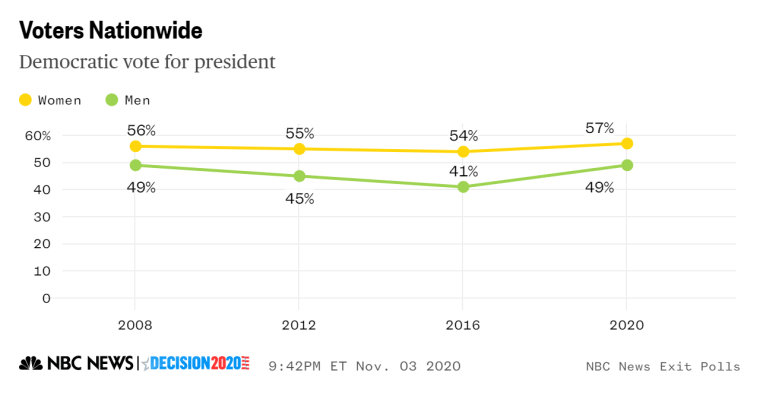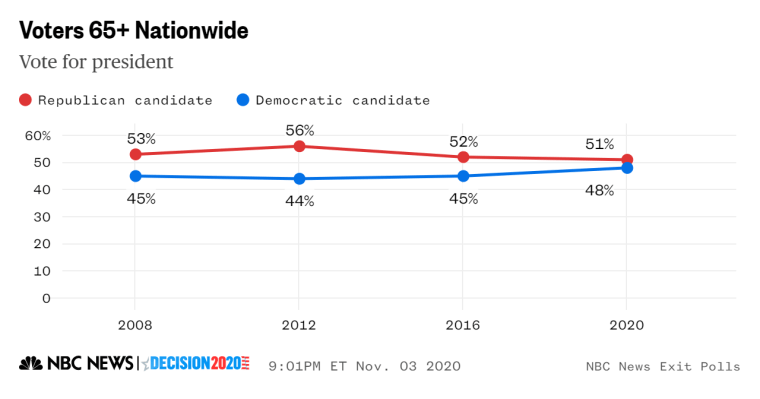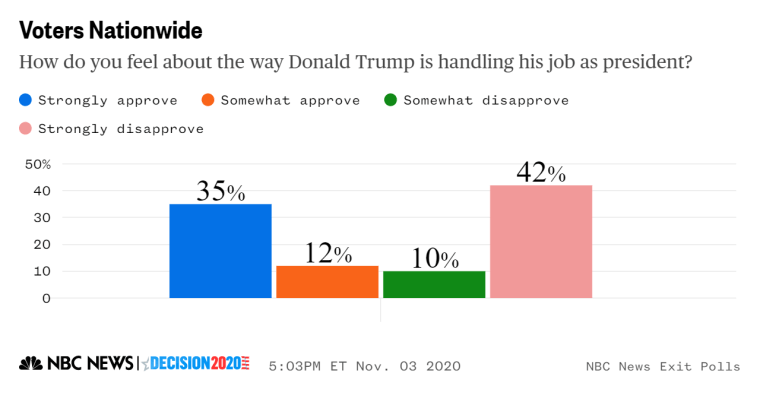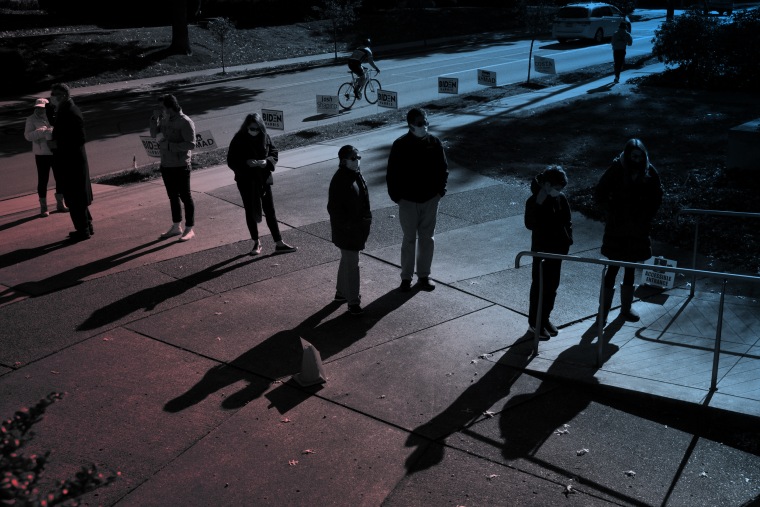The early data from the NBC News Exit Poll of early and Election Day voters point to some key themes in the crucial states that President Donald Trump took from the Democrats in 2016 — Wisconsin, Michigan and Pennsylvania.
Support for Trump among white college graduates is generally trending down across the states formerly known as the "blue wall," according to the NBC News Exit Poll of early and Election Day voters.
Trump is winning the support of 43 percent of college-educated white voters in Michigan, which is down from 51 percent in 2016. The pattern is similar in Pennsylvania, though far less pronounced in Wisconsin.
The exit poll data indicates that support for Trump has also dropped in this region among white voters who did not graduate college, with the notable exception of Pennsylvania.
In the Keystone State, Trump is maintaining his strong support among working-class white voters, carrying nearly two-thirds of their vote this year. In Michigan and Wisconsin, however, Trump’s vote share among white voters who did not graduate college is down by about 5 to 8 percentage points.
In Michigan and Wisconsin, Democratic nominee Joe Biden is reversing much of the dip in Democratic union support that hampered Hillary Clinton in 2016. Clinton carried the union vote in both states, but she did so by smaller margins than former President Barack Obama in 2012. Trump’s appeals to disaffected workers were effective in making major inroads with union voters.
Biden is regaining some of the union support that Trump siphoned off in 2016, according to exit poll data. This year 61 percent of Michigan voters in union households and 62 percent of Wisconsin voters in union households are supporting Biden. Trump’s union support in both states has fallen below 40 percent.
Michigan union households cite the economy as the issue mattering most to their vote (33 percent), while smaller shares cited the coronavirus pandemic (20 percent), racial inequality (20 percent), health care policy (13 percent) and crime and safety (7 percent). About one in five Michigan voters — 22 percent — belongs to a household with at least one labor union member.
In neighboring Minnesota, which NBC News projects will go to Biden, white college-educated voters helped buoy the Democrat in a state carried by Hillary Clinton in 2016.
Two-thirds of white college educated voters casting ballots said they supported Biden, according to the exit poll data; just a third are voting for Trump. This is a massive since shift 2016, when Trump captured 41 percent of white college-educated voters.
In particular, white college-educated women have moved sharply to the left since 2016. Four years ago, Clinton won this group by 15 percentage points — 54 percent cast a ballot for Clinton, while 39 percent cast a ballot for Trump. In the 2020 race, Biden leads Trump among white women with a college degree by almost 40 percentage points.
The presidential races in Michigan, Wisconsin and Pennsylvania were too early to call as of 3:30 a.m. ET. Tuesday.
The gender gap
The gender gap is alive and well in the 2020 presidential race — but overall not quite as large as the two prior elections, thanks to a notable eight-point increase in men voters' support for Biden, according to the data.
Biden is performing better nationally among both men and women than Hillary Clinton did four years age. The increase is particularly large among men, who are breaking about evenly between Biden (48 percent) and President Donald Trump (49 percent).
Female voters are supporting Biden (56 percent) by only about three points more than they did Hillary Clinton (54 percent).

For four decades, support for Democratic presidential candidates has been higher among women than men. This gender gap is one of the most durable features of modern American presidential elections.
Biden is polling well with men overall, but perhaps even more striking is his success with a key subgroup: white suburban men. Nationwide, about 40 percent of white suburban men are breaking for Biden this year, which is up from 2012 (34 percent) and 2016 (28 percent). Democratic support among white suburban women, by contrast, has remained stable.
Trump keeps edge with seniors
Despite speculation that Trump might lose the vote among seniors, he is holding his own with voters 65 and older, according to the exit poll data.
Trump is leading in the senior vote by roughly 3 points, 51 percent to 48 percent, which is a narrower margin than recent elections.

The coronavirus pandemic has taken an enormous toll on older adults — and about 2 out of 3 voters 65 and older reported that the coronavirus was an important factor in their presidential vote.
Still, these older voters reported that the economy mattered more in their decision in the presidential race than the pandemic. Thirty-one percent of adults 65 and older said the economy was the most important issue affecting their vote, while 24 percent said the same of the coronavirus.
When it came to handling the economy, older voters gave Trump an edge (53 percent) over Biden (43 percent). Older voters were more evenly divided on who they thought would better handle the coronavirus, narrowly choosing Biden (48 percent) over Trump (45 percent).
In the critical swing state of Florida, where there is a particularly large concentration of older voters, Trump did even better: 56 percent of voters 65 and over in Florida said they believed that Trump would better handle the economy, while 52 percent felt that Trump would better handle the coronavirus pandemic.
Trump's job approval rating at 47 percent
Fewer than half of Americans casting ballots in the 2020 presidential election — 47 percent — approve of Trump's performance in office, according to early data from the NBC News Exit Poll of early and Election Day voters.
Fifty-one percent of voters disapprove of his performance as president, according to the exit poll data.
Trump elicited strong sentiments in both directions. A third of voters expressed strong approval of Trump’s presidency, while about 4 in 10 voters said they strongly disapproved.
Trump's approval rating in the early results is slightly higher than it was in the final NBC News/Wall Street Journal poll, which was conducted Oct. 29-31 and found 45 percent of registered voters approved of his performance.
Trump's approval rating has been below 50 percent in most public polls of Americans, with the exception of the first few months of his term.

Overall, though, voters view Trump more favorably than they did in 2016, according to the results. More voters also said this year that they think Trump is presidential, and more said they are optimistic about the prospect of his victory.
This year, 45 percent of voters said their opinion of Trump was favorable, while 53 percent said it was unfavorable. That’s a dramatic narrowing of the favorability gap Trump faced among voters in 2016, when it was 38 percent to 60 percent.
Trump has improved in voters’ minds in other ways over the past four years. When asked if they think Trump has the “temperament to serve effectively as president,” 44 percent of voters this year said yes. In 2016, just 35 percent thought so. This year, 45 percent of voters said they’d be either “excited” or “optimistic” if he wins the presidency; that’s up from 40 percent in 2016.
To be sure, Trump remains underwater on all of these questions: As in 2016, majorities of voters this year gave him negative marks on favorability, temperament and their reaction to a potential win.
And voters said they made up their minds early, with just 5 percent saying they waited until the week before Election Day to decide on their presidential candidate, according to the exit poll. That’s a substantially smaller share than those who waited until the last minute to decide in 2016, when some 13 percent of the electorate said they waited until the final week to decide on their vote.
Most voters — 72 percent — say they made up their mind before the campaign began in earnest on Labor Day. The remainder said they decided sometime in September or October, according to the exit poll.
Read more on our exit poll methodology, and how we’re counting early voters.
This year, the few voters who waited until the last week broke for Trump against his rival Biden, 54 percent to 40 percent. Trump won late deciders more narrowly in 2016, garnering 45 percent to Hillary Clinton’s 42 percent.
In terms of new voters, Biden is the overwhelming favorite of those who are casting ballots in a presidential election for the first time – and is faring even better than Clinton did among this group in 2016.
Thirteen percent of voters casting ballots for president in the 2020 contest have never done so before, according to exit poll data — and these voters make up a slightly larger share of the electorate than they did four years ago.
Economy top issue for voters
When it comes to the issues, about a third of voters said the economy was the most important issue to their vote, according to the early data.
Racial injustice was the most important issue for 20 percent of voters, while another 17 percent said the coronavirus outbreak was their top issue.
When it comes to the pandemic, voters said they think Biden is the best candidate to better handle the crisis.
Fifty-one percent of voters nationwide say Biden would better manage the virus; 43 percent of voters say Trump would do a better job.
The Trump administration has faced significant criticism over the president’s handling of the virus, and he has sparred with public officials in recent days as case counts spike across the country.
But as the U.S economy strives to recover from record job losses and an economic downturn this year, Trump and Biden are more competitive among voters on the economy: Forty-eight percent of voters say Biden would better handle the economy, while a 50 percent say Trump would do a better job.
Majority say efforts to contain virus is going badly
As U.S. coronavirus infections topped 9 million confirmed cases this weekend, many voters across the country casting ballots in the 2020 presidential contest say efforts to contain the pandemic are not going very well.
Fifty percent of voters nationwide say containment efforts are going badly, according to the results — including 34 percent who say they are going very badly.
Trump and Biden voters are divided on the most pressing issues, though.
Biden voters are significantly more likely than Trump’s voters to point to racial inequality and the coronavirus as important issues. Trump voters, for their part, are more likely to point to the economy and crime and safety.
As the country absorbs the economic hit delivered by the coronavirus pandemic, about half of Americans voting in the 2020 presidential election rate the U.S. economy negatively, according to the results.
But only a slim share of voters say their own household finances are worse today than they were when Trump took office four years ago.
When asked to assess the condition of the nation’s economy, half of voters said the economy is either "not so good" or "poor."
The remainder of voters are more optimistic: Forty-nine percent say the economy is currently either "excellent" or "good" — better numbers for the economy than in 2016, when roughly 6 in 10 voters gave it a negative rating.
'Law and order'
With protests around racial inequality and policing occurring in cities across the country this year, many Republican candidates — and especially President Trump — sought to appeal to suburban white women by emphasizing a commitment to law and order. But according to early exit poll results, the economy was a far bigger issue in deciding how this group voted for president.
Only 11 percent of suburban white women said that crime was the issue that mattered most to their vote, about the same share who said racial inequality was the most important issue.
When asked about the Black Lives Matter movement and the criminal justice system, more than half of white suburban women said they hold a favorable view of Black Lives Matter, and nearly half said they believe the justice system is unfair to Black people, the poll found.

